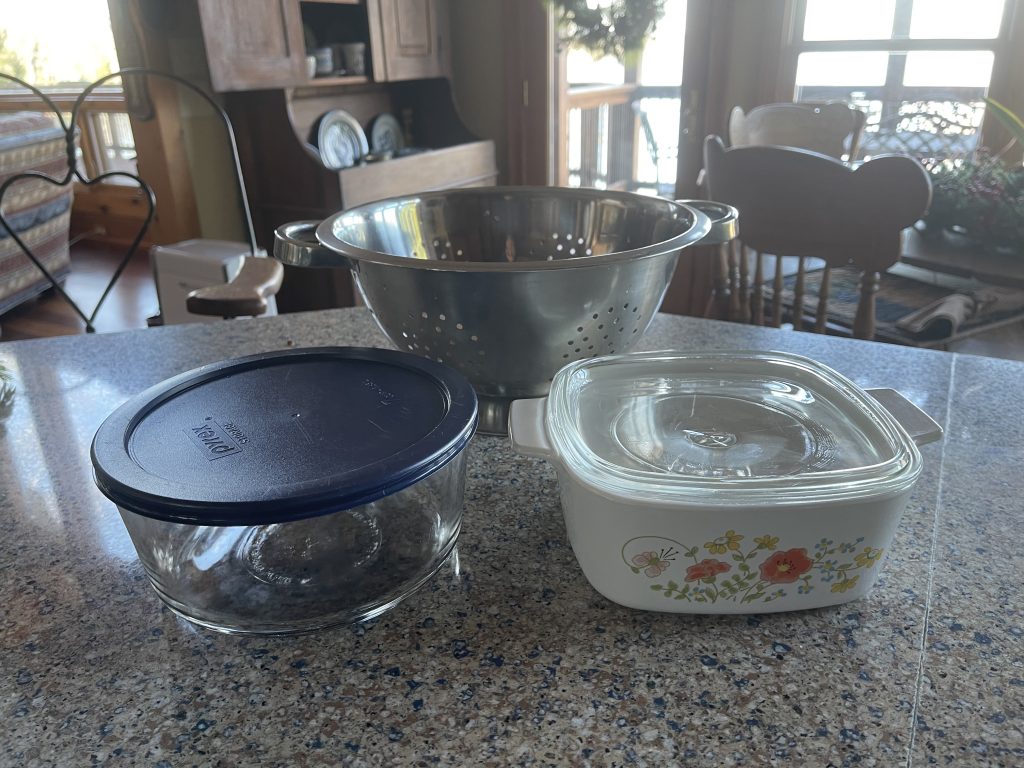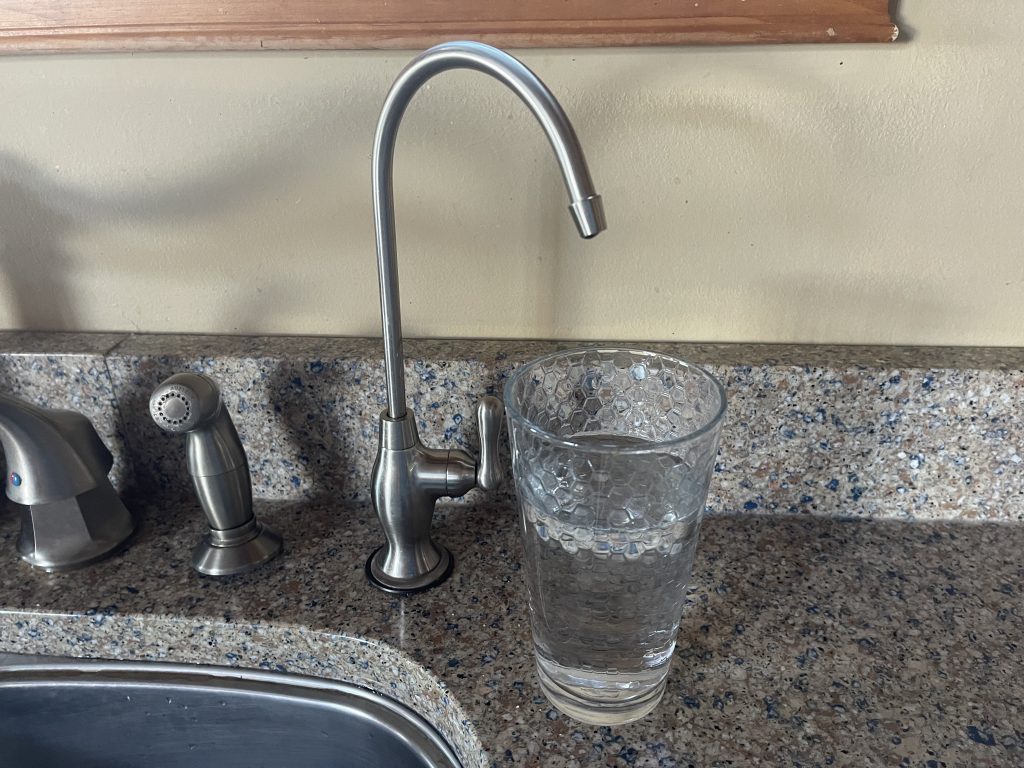I never considered how plastics were impacting my health until several years after my cancer diagnosis. On a daily basis, I was drinking from plastic bottles, storing my food in plastic, eating seafood without considering where it was obtained from, and drinking water from my tap without considering the consequences. Plastics are all around us. We use them for convenience. It’s time we realize the impact plastics can have on our health and wellbeing. Plastics are now a 600 billion dollar global industry. And they are not going away!
In today’s world, we know that humans ingest microplastics through the food chain. According to Dr. Josh Axe’s website, microplastics are now detected in our air, rain, seafood, and in our human feces.
And here’s one key problem—many plastics release estrogenic chemicals—especially when exposed to heat. This includes heating food in plastic containers in the microwave. These estrogenic chemicals may be one of the reasons why so many women and men have cancers driven by estrogen dominance and also may be a contributing factor to hormone imbalances.
Other problems with accumulated microplastics in the body shown in recent research include enhanced inflammatory response, suppression of the immune function, and disruption of the gut microbiome. This gut is where 70 percent of your immune system is housed. In addition, microplastics can get into our water supply. It was just a few years ago that Citadel researchers found microplastics in Columbia, SC’s drinking water supply.
So what can we do to lessen our plastic toxin load? Last week, I gave you suggestions for avoiding plastic contamination with coffee and tea drinking. But this is just one of several things you’ll need to do if you don’t want high amounts of plastics building up in your body and organs.
Here are six more ways to reduce plastics to protect your health:
Drink filtered water.
Now that you know that researchers found microplastics in a drinking water supply in SC, it’s time to take action. The problem is not just in Flint, Michigan. And don’t blame the water companies! They are doing the best they can in this plastic-consuming world. I recommend reverse osmosis as it removes over 99 percent of contaminants. Drinking spring water from a good source is also advised.
Drink fluids in steel, glass, or ceramic mugs.
Not from plastic bottles! But remember that our need for hydration is more important than not drinking water if that’s all that is offered. If you need water and you can only find bottled, drink it for your body’s sake! It’s what we do on a daily basis that causes plastics and toxins to accumulate in our bodies.
Store foods in steel, glass or Corningware containers.
It took me a few years, but I eventually switched out my plastic containers and replaced them with Corningware, steel with lids, and glass with lids. Even though the lids are hard rubber/plastic, I make sure not to fill them so the lid touches the food.

I gradually shifted to glass, pyrex, and steel containers for baking, storing, and food preparation.
Eat wild-caught seafood from reputable sources.
I love shrimp and scallops, which are both bottom feeders. I also love salmon. These are all great sources of protein (and omegas, too, for salmon). Check your sources means buy from companies that test for plastic and toxic residue and they don’t catch their seafood close to the shore where there are more toxins and plastics. And don’t eat seafood for every meal!
Sweat daily through exercise.
With all the toxins we are exposed to on a daily basis, sweating is a great way to remove them. You can also occasionally sweat in a sauna. I now do this twice a week, but after chemotherapy (talk about toxic overload), I did this three times a week to sweat all those toxins out over time.
Hydrate properly.
Many nutritionists advise drinking half your body weight in fluid ounces daily. Our body has five filtering systems, which protect us from toxins—the liver, lungs, colon, kidneys, and skin. Our skin is our largest detox organ. But these filtering systems need sufficient water to work properly.
Our goal is to reduce our toxic and plastic load so our immune system and body can function as God intended. Our goal is never to eliminate all toxins. This is simply not possible in the world we live in. We must learn to live safely in this toxic world if we are to remain healthy. Plastic accumulation can have an impact on our hormones, suppress our immune system, increase our risk for cancer, disrupt our gut microbiome, and can trigger inflammation. God gave us dominion over creation and the charge to protect the earth. We’re not doing such a great job!
What other suggestions do you have for reducing our plastic load?
For Your Health,
Ginny
 Ginny Dent Brant is a speaker and writer who grew up in the halls of power in Washington, DC. She has battled cancer, ministered around the world, and served on the front lines of American culture as a counselor, educator, wellness advocate, and adjunct professor. Brant’s award-winning book, Finding True Freedom: From the White House to the World, was endorsed by Chuck Colson and featured in many TV and media interviews. Unleash Your God-Given Healing: Eight Steps to Prevent and Survive Cancer was released in May 2020 after her journey with cancer and was recently awarded the First Place Golden Scrolls Award for Memoirs, and Second Place in both Selah Awards for Memoirs and Director’s Choice Award for Nonfiction at the Blue Ridge Mountain Christian Writer’s Conference. It recently received the Christian Authors Network’s (CAN) Gold Award for Excellence in Marketing for reaching 62.5 million people with a message of cancer prevention and survival. It was written with commentary from an oncologist and was featured on CBN’s Healthy Living Show, Atlanta Live, and CTN’s Homekeepers along with over 75 media outlets. Learn more and cancer and wellness prevention blog and book information at www.ginnybrant.com.
Ginny Dent Brant is a speaker and writer who grew up in the halls of power in Washington, DC. She has battled cancer, ministered around the world, and served on the front lines of American culture as a counselor, educator, wellness advocate, and adjunct professor. Brant’s award-winning book, Finding True Freedom: From the White House to the World, was endorsed by Chuck Colson and featured in many TV and media interviews. Unleash Your God-Given Healing: Eight Steps to Prevent and Survive Cancer was released in May 2020 after her journey with cancer and was recently awarded the First Place Golden Scrolls Award for Memoirs, and Second Place in both Selah Awards for Memoirs and Director’s Choice Award for Nonfiction at the Blue Ridge Mountain Christian Writer’s Conference. It recently received the Christian Authors Network’s (CAN) Gold Award for Excellence in Marketing for reaching 62.5 million people with a message of cancer prevention and survival. It was written with commentary from an oncologist and was featured on CBN’s Healthy Living Show, Atlanta Live, and CTN’s Homekeepers along with over 75 media outlets. Learn more and cancer and wellness prevention blog and book information at www.ginnybrant.com.







